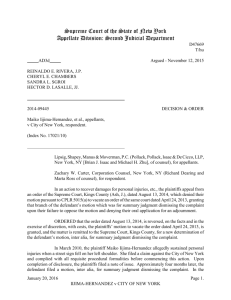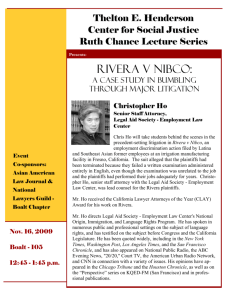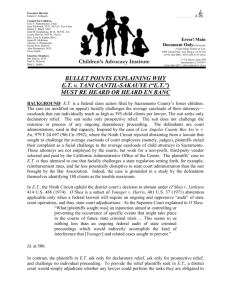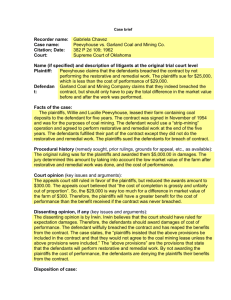Court of Chancery dismissed Plaintiffs' claims for equitable fraud
advertisement
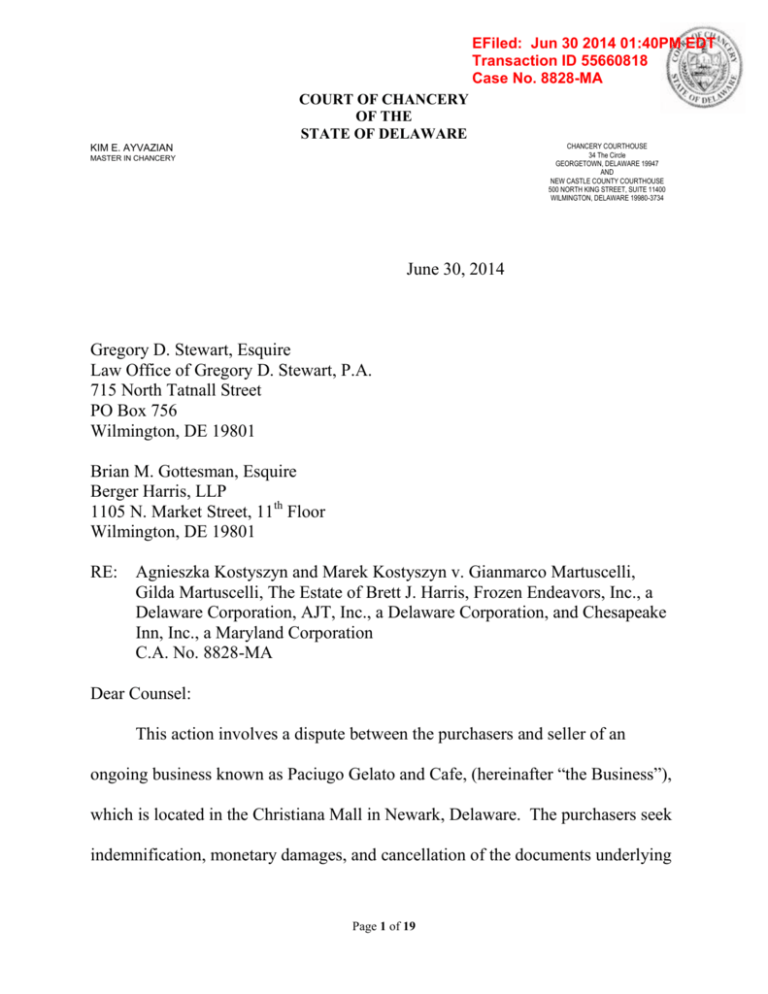
EFiled: Jun 30 2014 01:40PM EDT Transaction ID 55660818 Case No. 8828-MA COURT OF CHANCERY OF THE STATE OF DELAWARE CHANCERY COURTHOUSE 34 The Circle GEORGETOWN, DELAWARE 19947 AND NEW CASTLE COUNTY COURTHOUSE 500 NORTH KING STREET, SUITE 11400 WILMINGTON, DELAWARE 19980-3734 KIM E. AYVAZIAN MASTER IN CHANCERY June 30, 2014 Gregory D. Stewart, Esquire Law Office of Gregory D. Stewart, P.A. 715 North Tatnall Street PO Box 756 Wilmington, DE 19801 Brian M. Gottesman, Esquire Berger Harris, LLP 1105 N. Market Street, 11th Floor Wilmington, DE 19801 RE: Agnieszka Kostyszyn and Marek Kostyszyn v. Gianmarco Martuscelli, Gilda Martuscelli, The Estate of Brett J. Harris, Frozen Endeavors, Inc., a Delaware Corporation, AJT, Inc., a Delaware Corporation, and Chesapeake Inn, Inc., a Maryland Corporation C.A. No. 8828-MA Dear Counsel: This action involves a dispute between the purchasers and seller of an ongoing business known as Paciugo Gelato and Cafe, (hereinafter “the Business”), which is located in the Christiana Mall in Newark, Delaware. The purchasers seek indemnification, monetary damages, and cancellation of the documents underlying Page 1 of 19 the agreement they made with the seller in December 2011 to purchase the assets of the Business for a purchase price of $272,500.00. The purchasers contend that the seller misrepresented the financial condition of the Business and breached seller’s agreement to continue purchasing gelato from the Business for sale in its other three retail businesses. Nearly two years after purchasing the Business, purchasers filed a Verified Amended Complaint (the “Complaint”) on September 5, 2013, against the seller and several other defendants.1 The Complaint alleges: (i) breach of contract; (ii) breach of warranty; (iii) indemnification; (iv) equitable fraud; (v) fraud; (vi) negligent misrepresentation; (vii) intentional misrepresentation; and (viii) breach of the covenant of good faith and fair dealing. The Complaint contains nine prayers for relief, seeking declaratory relief, money damages, cancellation of the documents underlying the sale of the Business, an accounting, and “[s]uch other and further relief as this Court deems just and equitable under the circumstances.”2 On October 22, 2013, seller and the other defendants moved to dismiss the Complaint under Court of Chancery Rules 9(b), 12(b)(1), and 12(b)(6).3 Following briefing on the motion, oral argument took place on March 20, 2014, at the conclusion of which I reserved decision. 1 The original complaint was filed on August 22, 2013, but misstated the name of Frozen Endeavors, Inc. and did not include AJT, Inc. or Chesapeake Inn, Inc. as defendants. Docket Item No. 1 (hereinafter “DI No. #). 2 DI No. 8. Page 2 of 19 Defendants have moved to dismiss the Complaint in its entirety on the grounds that this Court lacks subject matter jurisdiction over plaintiffs’ claims and, in any event, that plaintiffs have failed to plead their fraud claims with sufficient particularity, and have failed to state a claim upon which relief may be granted in all counts as well. See Rules 9(b), 12(b)(1), and (b)(6). In this draft report, I recommend that the Court dismiss plaintiffs’ equitable claim (Count IV) with prejudice under Rule 12(b)(6), but allow plaintiffs to transfer their remaining legal claims to a court of law. Factual Background4 The plaintiffs are Agnieszka and Marek Kostyszyn, who purchased the Business in December 2011 from Defendant Frozen Endeavors, Inc. The other defendants are the Estate of Brett J. Harris,5 Gianmarco and Gilda Martuscelli, AJT, Inc., and Chesapeake Inn, Inc. The Martuscellis are principals in Frozen Endeavors, Inc., AJT, Inc., and Chesapeake Inn, Inc. AJT, Inc. owns and operates La Casa Pasta Restaurant in Newark, Delaware, while Chesapeake Inn, Inc. owns and operates the Chesapeake Inn, in Chesapeake City, Maryland, and formerly owned and operated the Canal Creamery and Sweet Shoppes (the “Creamery”) also in Chesapeake City, Maryland. 3 DI No. 18. The facts set forth herein are drawn from the Complaint and from documents incorporated by reference in the Complaint. 4 Page 3 of 19 On December 1, 2011, plaintiffs entered into an agreement of sale with Frozen Endeavors to purchase the Business for $272,500.00. The decision to purchase the Business and the purchase price was based upon sales information reported to Marek by Gianmarco and Harris at their first meeting, and subsequent statements provided to Marek regarding business earnings, on-site sales, catering sales, and profit analysis.6 Plaintiffs timely paid the purchase price in three installments, with the final installment being paid on December 31, 2011. The assets of the Business already had been transferred to plaintiffs on December 1, 2011. As part of the transaction, the Business’s ten-year lease with Christiana Mall was assumed by plaintiffs. At the first meeting between the parties, Gianmarco and Harris produced an earnings statement that reflected a profit of $7,186.21 on retail sales of $282,473.03 and catering sales of $74,882.00 (gross sales equaling $357,355.04) from the opening in July 2010 through August 2011.7 The agreement was drawn to reflect the importance of catering sales as consideration for the purchase. Section 5.d of the Agreement states that: “Seller shall continue to purchase gelato for Chesapeake Inn, Canal Creamery & Sweet Shoppe (“Creamery”) and La Casa 5 At his death on December 28, 2012, Brett Harris was a principal in Frozen Endeavors and the business manager of Chesapeake Inn, Inc. Defendants’ Opening Brief at 4n.2. 6 I use first names here to avoid confusion and unnecessary repetition, and mean no disrespect by this practice. 7 Complaint, Plaintiffs’ Ex. 1. Page 4 of 19 Pasta for a period of ten years so long as Buyer does not breach its obligations under this agreement of Buyer’s lease with Christiana Mall, LLC.”8 Following the sale of the Business to plaintiffs, catering sales dropped in 2012 to $18,475.00. In August 2011, defendants Gianmarco, Harris, Gilda, and Chesapeake Inn had begun offering ice cream at the Creamery without notifying plaintiffs. Furthermore, by agreeing to purchase gelato for a period of ten years, defendants had represented that they would continue to operate the Creamery for a period of ten years when, in fact, they only held a three-year lease on the property where that business was located. In an email to Marek dated July 2, 2013, Gianmarco admitted that he sold his interest in the Creamery prior to the end of the three-year lease because he had been losing money at that location for the past two years (2011 and 2012). The Business’s catering sales for the period of January 1, 2013 to August 13, 2013, to the Chesapeake Inn and La Casa Pasta totaled only $3,300.00. In another email to Marek dated July 3, 2013, Gianmarco stated that: I lost money at [the Business] and the Creamery but I tried my best and it wasn’t good enough. [Harris] and I sold [the Business] because we were both losing too much money ([Harris] lost all his savings and had nothing left). We sold you the business while still owing the bank over $70k in a loan that I just finished paying off this year. We didn’t make any money from you or anything associated with [the Business]. We were absentee owners who couldn’t afford to pay the bills any longer.9 8 Complaint, Plaintiffs’ Ex. 2 at p. 3. 9 Id. Page 5 of 19 Plaintiffs now allege that the overstatement of the continuing agreement to purchase gelato, along with defendants’ improper representations, assurances, business practices and financial statements, which were false and misleading, directly resulted in plaintiffs calculating a purchase price that was more than they would otherwise have been willing to pay for the Business. Furthermore, defendants’ failure to disclose that the Business was “losing too much money” caused the plaintiffs to enter into a long term lease with Christiana Mall, exposing the assets of the Business to potential claims and the plaintiffs to personal liability under the terms of the lease if the Business were to fail. Issues Defendants have moved to dismiss the Complaint on three grounds. First, they contend that under Rule 12(b)(1), this Complaint should be dismissed for lack of subject matter jurisdiction because plaintiffs’ only claims sounding in equity – equitable fraud/negligent misrepresentation – fail as a matter of law under Rule 12(b)(6). Defendants argue that the only other potential basis for equitable jurisdiction, i.e., plaintiffs’ prayers for relief requesting cancellation/rescission and an accounting, also fail because plaintiffs waited too long to seek rescission and have failed to plead a predicate basis for which they would be entitled to the remedy of an accounting. According to defendants, plaintiffs have failed to state a claim under Rule 12(b)(6) and failed to meet the pleading requirements set forth in Page 6 of 19 Rule 9(b) for fraud, misrepresentation, equitable fraud, and negligent misrepresentation, and have failed to state a claim under Rule 12(b)(6) for breach of contract, breach of express warranty, indemnification, and breach of the implied covenant of good faith and fair dealing. Plaintiffs oppose the motion, arguing that as to the Court’s subject matter jurisdiction, their pleadings contain prayers for equitable relief, specifically for cancellation of the agreement and an accounting, and in general as justice requires. Furthermore, they argue that all of defendants’ arguments regarding the substantive law of Delaware are nonresponsive, irrelevant and moot because the sales agreement executed by the parties contains an express choice of law provision stating that the agreement shall be governed by Maryland law.10 Plaintiffs contend that they have sufficiently pled their tort claims against the defendants based on defendants’ failure to disclose information regarding catering sales, the intended closing of the Creamery, the material change to the operation of the Creamery, and the misstatements and misrepresentations of the financial condition of Frozen Endeavors and the Creamery. Finally, plaintiffs point out that defendants have failed to cite any relevant Maryland authority to support their contention that plaintiffs have failed to state a claim under Rule 12(b)(6) in connection with their breach of contract claims. 10 Complaint, Plaintiffs’ Ex. 2 at ¶ 9(i). Page 7 of 19 In reply, defendants argue that plaintiffs have failed to state a claim for equitable fraud under both Maryland and Delaware law. Defendants maintain that the equitable remedy of an accounting is not available because the Complaint fails to allege the existence of: (1) mutual accounts between the parties; (2) a fiduciary relationship where the defendant has a duty to account; or (3) the accounts are on one side but there are circumstances of great complication, citing Business Funding Group, Inc. v. Architectural Renovators, Inc., 1993 WL 104611, at *2 (Del. Ch. Mar, 13, 1993). Finally, defendants argue that plaintiffs’ request for the equitable remedy of cancellation is untimely. According to defendants, not only have plaintiffs failed to allege that they are ready, willing and capable of returning and restoring the status quo ante, but also the facts alleged in the Complaint show that the status quo ante is incapable of being restored because plaintiffs’ request for cancellation comes after nearly two years of operating the company as a going concern. Since money damages lie at the core of the Complaint, however, defendants argue that dismissing these equitable remedies will not result in any prejudice to plaintiffs. Analysis “This Court will dismiss an action under Rule 12(b)(1) ‘if it appears from the record that the Court does not have subject matter jurisdiction over the claim.’” Zebroski v. Progressive Direct Ins. Co., 2014 WL 2156984, at *3 (Del. Ch. Apr. Page 8 of 19 30, 2014) (quoting Envo, Inc. v. Walters, 2009 WL 5173807, at *4 (Del. Ch. Dec. 30, 2009)). The party seeking relief in this Court has the burden of establishing the Court’s subject matter jurisdiction. Id. However, when a challenge under Rule 12(b)(1) is directed to the face of the complaint, the court accepts the plaintiff’s allegations of facts. Id. (citing Diebold Computer Leasing, Inc. v. Commercial Credit Corp., 267 A.2d 586, 588 (Del. 1970)). There are only three avenues by which the Court acquires subject matter jurisdiction over a case: (1) the invocation of an equitable right; (2) the request for an equitable remedy where there is no adequate remedy at law; or (3) a statutory delegation of subject matter jurisdiction. Id. (citing Candlewood Timber Gp., LLC v. Pan Am. Energy, LLC, 859 A.2d 989, 997 (Del. 2004), 10 Del. C. §§ 341, 342)). Where a complete remedy otherwise exists, but the plaintiff has requested some type of traditional equitable relief as a means of gaining access to this Court, the Court will not exercise subject matter jurisdiction. Id. (citing Medek v. Medek, 2008 WL 4261017, at *3 (Del. Ch. Sept. 10, 2008)). In determining whether a legal, as opposed to an equitable remedy, is available and sufficiently adequate, the court must determine whether the nature of both the wrong alleged and the relief sought supports a finding that only equity can provided a remedy. Zebroski, 2014 WL 2156984, at *4 (Del. Ch.). Here, in Count IV of the Complaint, plaintiffs are asking the Court to cancel, i.e., to rescind, the Page 9 of 19 agreement of sale, the promissory notes, the assignment of the lease with Christiana Mall, and the security interest on the ground of equitable fraud.11 Defendants have moved to dismiss this count under Rules 12(b)(1) and 12(b)(6). Since a cause of action for equitable fraud can be adjudicated only in a court of equity, Zebroski, 2014 WL 2156984, at *6 (Del. Ch.), and because plaintiffs are seeking equitable rescission as a remedy for alleged equitable fraud, I first will address the issue whether plaintiffs have stated a claim for equitable fraud. When considering a motion to dismiss under Rule 12(b)(6), the Court will accept: all well-pleaded factual allegations in the Complaint as true, accept even vague allegations in the Complaint as ‘well-pleaded’ if they provide the defendant notice of the claim, draw all reasonable inferences in favor of the plaintiff, and deny the motion unless the plaintiff could not recover any reasonably conceivable set of circumstances susceptible of proof. Cent. Mortg. Co. v. Morgan Stanley Mortg. Capital Hldgs. LLC, 27 A.3d 531, 536 (Del. 2011). Thus, if the factual allegations of the complaint would entitle plaintiff to relief under a “reasonable conceivable set of circumstances,” the court must deny the motion to dismiss. Zebroski, 2014 WL 2156984, at *6 (Del. Ch.). However, the failure to plead an element of a claim precludes entitlement to relief, and the court may dismiss a claim for that basis. Id. 11 In the same count, plaintiffs are also asking for monetary damages in an amount to be determined at trial. Page 10 of 19 Under Delaware law, the elements of equitable fraud are similar to those for common law fraud, except that the claimant need not show that respondent acted knowingly or recklessly – innocent or negligent omissions are sufficient. Envo, Inc., 2009 WL 5173807, at *6 (Del. Ch.). Despite the lack of a scienter requirement, the scope of equitable fraud is more narrow than common law fraud. It arises only when the claimant pleads the existence of: (1) “a special relationship between the parties or other special equities, such as some form of fiduciary relations”; or (2) a “justification for a remedy that only equity can afford.” Zebroski, 2014 WL 2156984, at *7 (Del. Ch.) (quoting Narrowstep, Inc. v. Onstream Media Corp., 2010 WL 5422405, at *13 (Del. Ch. Dec. 22, 2010) and Envo, 2009 WL 5173807, at *6 (Del. Ch.)). In Maryland law, there is no specific claim of equitable fraud; instead Maryland has a single claim of constructive fraud that may lie in law or equity. Maryland Environmental Trust v. Gaynor, 803 A.2d 512, 517 (Md. 2002) (quoting Ellerin v. Fairfax Savings, 652 A.2d 1117, 1126 n.11 (Md. 1995)) (“in order to succeed in establishing constructive fraud that justifies the rescission of a contract, a plaintiff must show the “breach of a legal or equitable duty which, irrespective of the moral guilt of the fraud feasor, the law declares fraudulent because of its tendency to deceive others, to violate public or private confidence or injure public interests.”). Constructive fraud in Maryland often involves the breach of a Page 11 of 19 fiduciary duty, see Dierker v. Eagle National Bank, 888 F.Supp.2d 645, 656 (D.Md. 2012) (citing Alleco Inc. v. Harry & Jeannette Weinberg Found., Inc., 665 A.2d 1038, 1049 n.6 (1995) (constructive fraud usually arises from a breach of duty where a relationship of trust and confidence exists)), but may also arise on the basis of a legal duty of care under negligence principles. See Dierker, 888 F. Supp.2d at 656 (“no authority bars a constructive fraud claim on the basis of a legal duty of care under negligence principles.”) (citing Jones v. State, 38 A.3d 333, 343 (Md. 2012)). Nowhere in the Complaint have plaintiffs pled the existence of a fiduciary, special, or confidential relationship between the parties that would give rise to a claim sounding in equity and, hence, subject matter jurisdiction in this Court. The parties here engaged in an arm’s length business transaction, and courts in Maryland and Delaware are reluctant to impute the principles of fiduciary relationships between parties in cases like this one. See Gegeas v. Sherrill, 147 A.223 (Md. 1958); Zebroski, 2014 WL 2156984, at *8 (Del. Ch.) (citing Wal-Mart Stores, Inc. v. AIG Life Ins. Co., 901 A.2d 106, 114 (Del. 2006)). Therefore, under both Delaware and Maryland law, I conclude that plaintiffs’ claim of equitable fraud should be dismissed with prejudice under Rule 12(b)(6) for failure to state a claim. Page 12 of 19 Nor have plaintiffs shown that special circumstances exist such that only equity can afford a remedy here. In Delaware, the remedy of rescission also may be awarded by law courts. E.I. DuPont De Nemours and Co. v. HEM Research, Inc., 1989 WL 122053, at *3 (Del. Ch. Oct. 13, 1989). An application for rescission of a contract in this Court is governed by the following equitable principles: (1) a party who discovers that he has been misled into entering into a contract by fraud must act with reasonable diligence if he seeks rescission rather than affirming the contract and suing for damages; and (2) rescission will not be granted unless the Court can restore the parties substantially to the same position which they occupied before making the contract. See Grzybowski v. Tracy, 2013 WL 4053515, at *7 (Del. Ch. Aug. 9, 2013). Thus, if a plaintiff is seeking the remedy of rescission, the status quo ante of the plaintiff and of the defendant as well must be restored. If that result cannot be substantially accomplished, rescission as an equitable remedy will be denied. See Hessler, Inc. v. Ellis, 167 A.2d 848, 851 (Del Ch. 1961) (denying prayer for rescission and cancellation of a lease agreement because complaint failed to disclose any offer to restore assignee of lease to former status). Plaintiffs have failed to allege anywhere in the Complaint that they are ready, willing and able to return defendants to the status quo ante. Plaintiffs have made no such allegation. This case involves an ongoing business and it is not Page 13 of 19 likely the current operation of the Business is the same as that which prevailed at the time of the sale in December 2011. See Craft v. Bariglio, 1984 WL 8207, at **12-13 (Del. Ch. March 1, 1984). In one material respect, it cannot be the same since the Creamery no longer exists and, therefore, cannot purchase gelato from the Business as before. It does not appear that this Court could realistically effectuate an order that would restore the parties to the status that existed on December 1, 2011. Thus, equitable rescission or cancellation is not available here. In addition, plaintiffs have not shown that, if the Court were to cancel all the legal documents underlying the sale of the Business, that any further equitable relief would be required, such as reestablishing title or recovery possession of property. Zebroski, 2014 WL 2156984, at *5 (citing E.I. DuPont de Nemours & Co., 1989 WL 122053 at *3 (Del. Ch.)). Since plaintiffs have failed to demonstrate that legal rescission would be inadequate here, I conclude that their request for the remedy of equitable rescission does not establish subject matter jurisdiction in this Court. Plaintiffs are also seeking the remedy of an accounting for all improper accounting activity prior to and including the date of the agreement of sale on December 1, 2011. An action for an accounting is properly cognizable in equity. Business Funding Group, Inc. v. Architectural Renovators, Inc., 1993 WL 104611, Page 14 of 19 at *1 (Del.Ch. Mar. 31, 1993). The only allegation of improper accounting activity in the Complaint, however, is found in Count V (Fraud) where plaintiffs claim that: [o]n information and belief, Defendants, Gianmarco, Harris, Gilda and [Frozen] Endeavors knew or should have known, in the exercise of reasonable care, that improper accounting methods were being employed at [the Business] and that the result of those improper accounting methods was to inflate the revenue and projections of the [Business] on its financial statements.12 While plaintiffs may request the remedy of an accounting, this request does not necessarily confer jurisdiction in the Court “because the Court may go beyond the prayers of the complaint and look at the substance of what the plaintiff seeks, to determine whether or not what the plaintiff really seeks is obtainable at law.” Id. (citing Hughes Tool Co. v. Fawcett Publications, Inc., 297 A.2d 428 (Del. Ch. 1972), rev’d on other grounds, 315 A.2d 577 (Del. 1974)). The core of plaintiffs’ complaint is that they did not receive the benefit of their bargain and have suffered financial losses due to fraud, misrepresentation, and breach of contract by defendants. What the plaintiffs are really seeking in this action are money damages, not an accounting. In Delaware, a party may be entitled to the remedy of an accounting only where there are mutual accounts between the parties, a fiduciary relationship exists and defendant has a duty to account, or the accounts are all on one side but there are circumstances of great complication. Business Funding Group, Inc., 1993 WL Page 15 of 19 104611, at *2 (Del. Ch.) (citations omitted.) There are no allegations of any fiduciary relationship between the parties, or the existence of mutual accounts. Plaintiffs have not alleged any circumstances of great complications involving the sale of the Business. It appears to have been a straightforward, arm’s length business transaction. As a result, I conclude that this Court lacks subject matter jurisdiction over this Complaint because plaintiffs are not entitled to the remedy of an accounting. At oral argument, defendants maintained that, even if I concluded that the Court lacks subject matter jurisdiction, I nonetheless should address plaintiffs’ remaining legal claims under the Court’s clean up doctrine, and dismiss them with prejudice under Rules 9(b) and 12(b)(6). Thus, defendants would have me review the sufficiency of plaintiffs’ seven remaining counts of intentional and negligent misrepresentation, indemnification, breach of warranty, breach of contract, and breach of the covenant of good faith and fair dealing at the pleading stage. In Sunrise Ventures, LLC, v. Rehoboth Canal Ventures, LLC, 2010 WL 363845, at * 10 (Del. Ch. Jan. 27, 2010), after plaintiffs’ equitable claims had been dismissed under the doctrine of laches, the Court declined to exercise clean up jurisdiction over one of the plaintiff’s assignee claims for lack of a timely equitable claim. Nevertheless, because the Court found that the time-barred claims for 12 Complaint, at ¶ 59. Page 16 of 19 rescission would have stated a claim for rescission had they not been barred by laches, and because the parties had invested scarce resources in briefing the validity of the claims pled, the Court addressed the pleading stage merits of the assignee claims for the sake of judicial efficiency so that the case would be “modestly less burdensome to the Superior Court.” Id. at *9. Ultimately, the Court dismissed all but two of the claims with prejudice for failure to state a claim. Id. at *13. The remaining two claims were dismissed without prejudice so that plaintiff might transfer them to Superior Court. Id. There are a variety of reasons why this Court may exercise its discretionary jurisdiction to hear legal claims, including to: (i) resolve a factual issue which must be determined in the proceedings; (ii) avoid a multiplicity of suits; (iii) promote judicial efficiency; (iv) do full justice; (v) avoid great expense; (vi) afford complete relief in one action; and (vii) overcome insufficient modes of procedure at law. Shore Investments, Inc., v. BHole, Inc., 2009 WL 2217744, at *3, (Del. Ch. July 14, 2009) (citing Clark v. Teeven Holding Co., Inc., 625 A.2d 869, 881 (Del. Ch. 1992)). See also Zebroski, 1014 WL 2156984, at *9, (Del. Ch.). However, another important aspect to consider is whether the facts involved in the legal and in the equitable claims “are so intertwined that it would be undesirable or impossible to sever them.” Shore Investments, Inc., 2009 WL 2217744, at *3 (Del. Ch.) (citing Clarke, 625 A.2d at 881)). Page 17 of 19 None of the reasons enumerated above apply in this case. In particular, no factual issue had to be determined at this stage in order for me to recommend dismissal with prejudice of plaintiffs’ equitable claim under Rule 12(b)(6) and their requested equitable relief under Rule 12(b)(1). It would be more efficient for the adequacy of plaintiffs’ seven legal claims based on fraud, tort, and contract to be decided in the first instance by a Superior Court judge, rather than have the parties brief exceptions to a Master’s draft report and final report in order to obtain a final decision by this Court, which might still result in a transfer to Superior Court and, thus, a multiplicity of suits. Therefore, I recommend that the Court decline to exercise its clean up doctrine over plaintiffs’ purely legal claims for money damages and legal rescission relating to the purchase of the Business. Conclusion For the above reasons, I recommend that this Court dismiss Count IV of the Complaint with prejudice for failure to state a claim under Rule 12(b)(6), and dismiss the remaining counts without prejudice for lack of subject matter jurisdiction under Rule 12 (b)(1) in order to allow plaintiffs to transfers their legal claims to Superior Court in accordance with 10 Del. C. § 1902. In addition, I recommend that this Court decline to exercise its clean up doctrine over plaintiffs’ legal claims. The parties are referred to Chancery Rule 144 for the process of Page 18 of 19 taking an exception to a Master’s Draft Report. Sincerely, /s/ Kim E. Ayvazian Kim E. Ayvazian Master in Chancery KEA/kekz Page 19 of 19
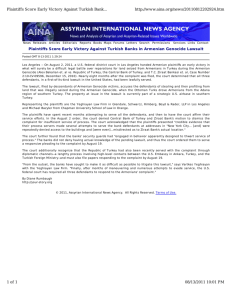
![[Click and Enter Attorney Name], State Bar No - E](http://s3.studylib.net/store/data/007177564_1-4d9407aff5e1ecb2a5922cd955484ee2-300x300.png)

